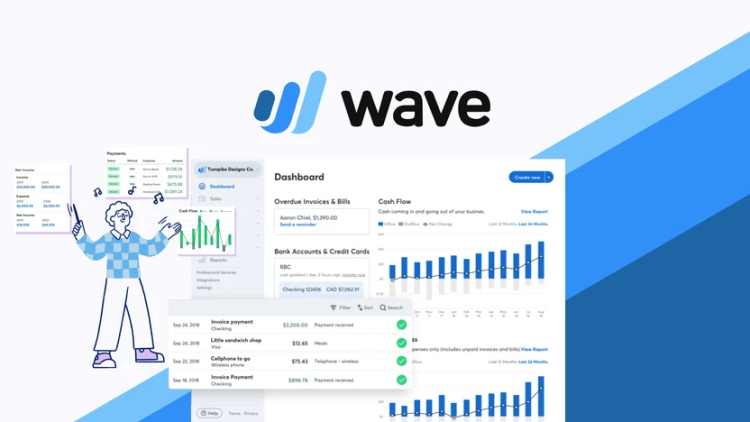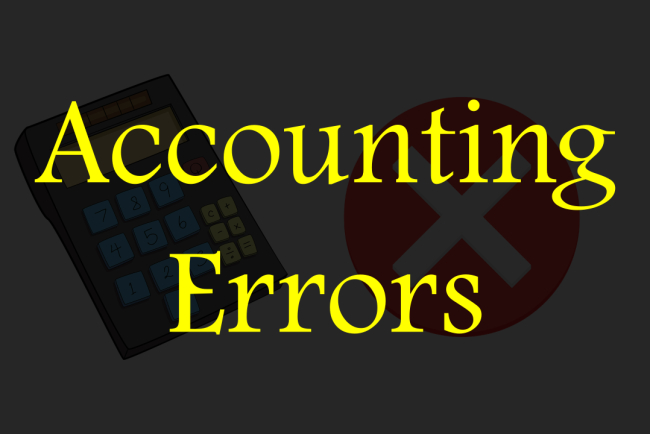Is invoicing automated in Wave Accounting? How can freelancers efficiently handle both invoicing and financial records for clients?
This guide dives into Wave Accounting’s invoicing automation and how freelancers and virtual bookkeepers can manage both invoicing and bookkeeping in one place. You’ll discover how to set up recurring invoices, enable payment reminders, and connect payments with bookkeeping records. The post explains when to let clients create their own invoices, when to take full control, and how to streamline your process for multiple clients. If you're a freelancer looking to simplify finance management, Wave is your one-stop solution. Is invoicing automated in Wave Accounting? Learn how freelancers can streamline invoicing and bookkeeping using Wave’s automation tools, recurring billing, and integrated reports — all from one dashboard.

Introduction
Freelancers and virtual bookkeepers often juggle multiple roles when managing client finances — from creating invoices to recording payments, categorizing expenses, and preparing reports. The process can get overwhelming, especially if you're using disconnected tools for each task.
This is where Wave Accounting stands out as an all-in-one solution. It's free, user-friendly, and powerful — especially when it comes to automated invoicing and streamlined bookkeeping. But many beginners still wonder:
“Is invoicing in Wave automated? And how can I manage both invoicing and bookkeeping efficiently for my clients?”
This detailed guide answers exactly that. You’ll learn how Wave automates key invoicing tasks, how you can integrate invoicing with bookkeeping, and how freelancers like you can manage multiple clients without chaos.
What Is Invoicing in Wave?
Invoicing is one of Wave’s most powerful and easy-to-use features. It allows you to create professional, branded invoices, send them to clients, and track payment status — all from within your dashboard.
Every invoice can include:
-
Client’s name and contact details
-
Your (or your client’s) business name and logo
-
A breakdown of services or products
-
Taxes, discounts, and due dates
-
Automatic payment links (if connected with Stripe or bank payments)
And yes — many of these actions can be automated, saving time and reducing errors.
Is Invoicing Automated in Wave?
Yes, to a great extent. Wave offers several automation tools for invoicing. These include:
1. Recurring Invoices
You can set up invoices that automatically go out weekly, monthly, or on any custom schedule.
Use Case:
If your client offers monthly services like social media management, you can automate the invoice to go out on the 1st of every month.
2. Automatic Payment Reminders
Wave sends email reminders to clients for:
-
Upcoming due dates
-
Overdue payments
-
Thank-you notes after payment
This ensures you (or your client) get paid on time — without manual follow-ups.
3. Invoice Templates
Once you design an invoice layout for one business, you can use the same style repeatedly. No need to start from scratch.
4. Auto-Generated Invoices from Estimates
If you first send a quote (estimate), you can convert it to an invoice with one click once the client approves.
5. Online Payment Integration
Wave allows invoices to be paid online via Stripe, credit cards, or bank transfers — automating the payment reconciliation process.
How Wave’s Invoicing Automation Saves Time for Freelancers
As a freelancer managing client accounts, automation in Wave helps you:
-
Avoid repetition: No need to recreate similar invoices every month
-
Stay on schedule: Invoices go out automatically, even if you're offline
-
Reduce payment delays: Reminders and online payments speed up cash flow
-
Minimize errors: Templates reduce the chance of manual mistakes
-
Focus on analysis: Spend less time chasing payments and more on strategy
Invoicing for Clients: Who Should Create Invoices?
A common question freelancers ask is:
“Should my clients create their own invoices, or should I do it as their bookkeeper?”
Option A: Clients Create Invoices
This works if:
-
The client wants control over sales
-
They prefer real-time access to customer data
-
You only need to track payments and record income
Option B: Freelancer Creates Invoices
This is ideal if:
-
Your client wants a hands-off approach
-
You’re offering full-service financial management
-
You need consistent formatting and data control
-
You also manage follow-ups or customer support
Best Practice: Combine Both
Let your client send you a list of billable items, and you create the invoices in Wave. This keeps formatting clean, ensures records are accurate, and centralizes control.
How to Handle Both Invoicing and Bookkeeping in Wave
If you're managing both invoicing and accounting, here’s how to streamline your workflow:
Step 1: Create or Access the Business Profile
Log in to your Wave account and create (or switch to) the business profile for the client you’re working with.
Step 2: Set Up Client Details
Go to “Sales” → “Customers” and add all clients’ customers. Include:
-
Name
-
Email
-
Address
-
Currency (if international)
This ensures all invoices are correctly attributed.
Step 3: Customize the Invoice Template
Under “Settings” → “Invoice customization,” add:
-
Client logo
-
Brand colors
-
Footer notes
-
Payment instructions
Step 4: Create and Automate Invoices
Click “Sales” → “Invoices” → “Create an invoice.”
Add service items, tax rates, payment terms, and notes.
To automate:
-
Click “Make Recurring”
-
Set invoice frequency (e.g., monthly)
-
Choose a start date
-
Enable auto-send
Step 5: Enable Online Payments (Optional)
Connect Stripe or bank payments if your client wants to receive money online. This also helps Wave auto-reconcile the payment in bookkeeping records.
Step 6: Track Payments and Send Reminders
Wave tracks invoice status:
-
Sent
-
Viewed
-
Overdue
-
Paid
You can enable or disable automatic reminders for due and overdue invoices.
Step 7: Reconcile in Accounting
Once an invoice is paid:
-
Wave marks it as “Paid”
-
Payment is auto-recorded
-
You can match it to a bank transaction
-
Income is updated in Profit & Loss statement
Step 8: Generate Reports
Under “Reports,” download:
-
Invoice Aging (unpaid invoice list)
-
Sales by Customer
-
Income by Item
-
Profit & Loss
These help your client stay informed on revenue.
What Wave Does Automatically (and What It Doesn’t)
| Task | Automated in Wave? |
|---|---|
| Sending recurring invoices | ✅ Yes |
| Payment reminders | ✅ Yes |
| Online payment processing | ✅ Yes |
| Updating payment status | ✅ Yes |
| Income categorization | ✅ Partially (manual adjustment may be needed) |
| Expense tracking | ❌ No (requires manual entry or receipt upload) |
| Bank reconciliation | ❌ Semi-automated (requires review) |
| Tax calculations | ✅ Yes (when configured properly) |
Common Mistakes to Avoid
-
Using the wrong business profile:
Always check that you’re in the correct client’s account before creating invoices. -
Forgetting to automate recurring payments:
If a client has monthly billing, use automation to reduce admin time. -
Not enabling payment reminders:
This leads to delayed payments. Turn on auto-reminders to reduce follow-ups. -
Failing to update product/services list:
Keep service names and pricing up to date in the invoice item list. -
Not categorizing income properly:
After invoice payment, double-check that it’s posted to the correct income account.
Freelancer Tips: Managing Multiple Clients with Invoicing
-
Create a naming system: Use invoice numbers like
ClientName-001 -
Set reminders: Even automated systems need monthly check-ins
-
Batch tasks: Create and schedule all invoices for the week/month in one go
-
Keep communication open: Let your clients know when invoices go out and when payments come in
-
Document everything: Save copies of all invoices and payment confirmations
Pros and Cons of Managing Invoicing as a Freelancer
| Pros | Cons |
|---|---|
| Full control over accuracy | Requires more responsibility |
| Better client service | Some clients may want real-time access |
| Integration with accounting | Can be time-consuming if not automated |
| Professional branding | Risk of burnout with too many clients |
FAQs
Q: Can I schedule invoices in Wave?
Yes. You can schedule recurring invoices with auto-send and set them to go out on specific dates.
Q: Can Wave accept online payments?
Yes. Wave integrates with Stripe and offers credit card and ACH bank payments.
Q: Can I track which invoices are paid and which aren’t?
Yes. The status of every invoice (sent, viewed, overdue, paid) is visible in your dashboard.
Q: Can my clients create their own invoices if they want?
Yes. You can invite them to their business profile and assign permissions like Editor or Admin.
Q: Are reminders sent automatically?
Yes. Wave sends email reminders for upcoming and overdue invoices, unless you disable them.
Conclusion
To answer the original question:
Yes, invoicing in Wave Accounting is automated — and it’s designed to help freelancers handle both invoicing and bookkeeping with ease.
From recurring invoices to payment reminders and automated tracking, Wave gives you all the tools to streamline client work, reduce errors, and save time.
As a freelancer managing multiple clients, you can:
-
Create, send, and track invoices professionally
-
Enable automation for recurring billing
-
Link payments with bookkeeping records
-
Generate reports on client income
-
Save time and offer better service
Whether you're handling five clients or fifty, Wave makes it possible to manage invoicing and financial records — all under one simple, powerful dashboard.
What's Your Reaction?





















